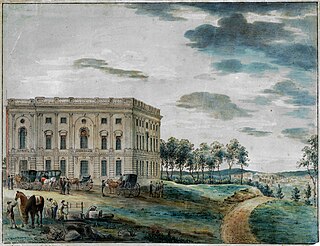
The 7th United States Congress was a meeting of the legislative branch of the United States federal government, consisting of the United States Senate and the United States House of Representatives. It met in Washington, D.C. from March 4, 1801, to March 4, 1803, during the first two years of Thomas Jefferson's presidency. The apportionment of seats in the House of Representatives was based on the 1790 United States census. Both chambers had a Democratic-Republican majority, except during the Special session of the Senate, when there was a Federalist majority in the Senate.

John Milledge was an American politician. He fought in the American Revolution and later served as United States Representative, 26th Governor of Georgia, and United States Senator. Milledge was a founder of Athens, Georgia, and the University of Georgia. From January to May 1809, Milledge served briefly as President pro tempore of the United States Senate.

The 1798–99 United States House of Representatives elections were held on various dates in various states between April 24, 1798 in New York and August 1, 1799 in Tennessee. Each state set its own date for its elections to the House of Representatives, with some after the official start of the 6th United States Congress on March 4, 1799, but before the start of the first session of this Congress in Philadelphia on December 2, 1799. These elections were held during President John Adams term. It was the last congressional session before the move to the new capital at Washington, D.C. Elections were held for all 106 seats, representing 16 states.
The 1801 United States Senate election in New York was held on January 27, 1801, by the New York State Legislature to elect a U.S. Senator to represent the State of New York in the United States Senate.

The 1800 United States House of Representatives elections in New York were held from April 29 to May 1, 1800, to elect ten U.S. Representatives to represent the State of New York in the United States House of Representatives of the 7th United States Congress.

The 1802 United States House of Representatives elections in New York were held from April 27 to 29, 1802, to elect 17 U.S. Representatives to represent the State of New York in the United States House of Representatives of the 8th United States Congress.

A special election was held in Georgia's 1st congressional district on July 9, 1792 to fill a vacancy caused by the House Committee on Elections finding on March 21, 1792 that electoral fraud had been involved in Anthony Wayne's election in 1791. His election was declared void and he was removed from the House.

A special election was held in Pennsylvania's 8th congressional district on January 15, 1801 to fill a vacancy left by the death of Thomas Hartley (F) on December 21, 1800

A special election was held in New York's 6th congressional district October 6–8, 1801 to fill a vacancy left by the resignation of John Bird (F) on July 26, 1801, prior to the first meeting of the 7th Congress.

A special election was held in Pennsylvania's 4th congressional district on October 13, 1801 to fill a vacancy left by the resignation of Peter Muhlenberg (DR) on March 3, 1801, prior to the beginning of the 7th Congress. Muhlenberg had been elected to the Senate.

Georgia's at-large congressional district special election, 1819 was called to fill a vacancy created when the former congressman was elected to the United States Senate.
A special election was held in Massachusetts's 3rd congressional district on December 15, 1800, to fill a vacancy left by the resignation of Samuel Lyman (F) on November 6, 1800.
A special election was held in Massachusetts's 4th congressional district August 24, 1801 to fill a vacancy caused by the resignation of Levi Lincoln Sr. (DR) on March 5, 1801, before the first session of Congress, upon being appointed U.S. Attorney General.
A special election was held in Massachusetts's 12th congressional district on five occasions between September 25, 1801 and July 29, 1802 to fill a vacancy left by the resignation of Silas Lee (F) on August 20, 1801, prior to the beginning of the 1st Session of the 7th Congress.
A special election was held in Massachusetts's 14th congressional district to fill the vacancy left by George Thatcher (F) declining to serve a 7th term, having served continuously since the 1st Congress and, after the death of Thomas Hartley (F) in Pennsylvania's 8th congressional district on December 21, 1800, the last remaining member of the 1st Congress to have continuously served in the House. The election was held on June 22, 1801

A special election was held in North Carolina's 8th congressional district on August 6, 1801, to fill a vacancy created when David Stone (F) resigned upon being elected to the Senate before the 7th Congress began.
A special election was held in South Carolina's 4th congressional district on April 12–13, 1802 to fill a vacancy resulting from the resignation of Thomas Sumter (DR) on December 15, 1801, upon being elected to the Senate.

A special election was held in Georgia's at-large congressional district on October 3, 1803 to fill a vacancy caused by the resignation, before the start of the 8th Congress, of John Milledge (DR), who had been elected Governor of Georgia.

A special election was held in Georgia's 1st congressional district on October 1, 1827 to fill a vacancy left by the resignation of Edward F. Tattnall (J) prior to the start of the 20th Congress.

A special election was held in Georgia's at-large congressional district on December 15, 1802 to fill a vacancy caused by the resignation of John Milledge (DR), who had been elected Governor of Georgia. The winner would only finish the term ending March 3, 1803. A separate election would also be held in October 1803 to fill the seat for the next term.







